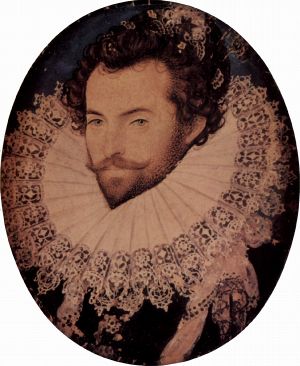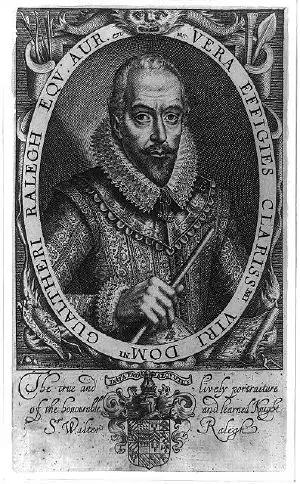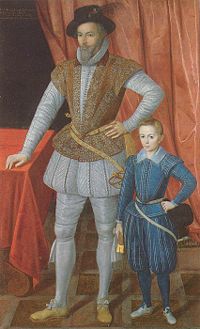Walter Raleigh
- Not to be confused with Walter Raleigh (professor).
Sir Walter Raleigh (1554 – 29 October, 1618) is famed as a writer, poet, courtier and explorer. Note that many alternate spellings of his surname exist, including Rawley, Ralegh, and Rawleigh; "Raleigh" appears most commonly today, though he, himself, used that spelling only once. His most consistent preference was for "Ralegh". The name is correctly pronounced "rawley", though in practice "rally" is the usual modern pronunciation.
Early life
Walter Raleigh was born at Hayes Barton, in Devon, England. He was the half brother of Sir Humphrey Gilbert and Adrian Gilbert; nephew of Sir Francis Drake through his first wife Alice Drake; and brother-in-law of Sir Richard Grenville through Alice's brother John [cf. George Edward Cokayne, The Complete Peerage]. He was also related to the Sackvilles or Sackfields of Dorset and apparently to most of the individuals whom he chose for his travels to the New World and other places. Raleigh's family was Protestant in religious orientation and experienced a number of near escapes during the reign of the Catholic queen Mary I of England. During childhood, Raleigh developed a hatred of Catholicism, proving himself quick to express it after the Protestant Queen Elizabeth I came to the throne in 1558. In 1572, he became an undergraduate at Oriel College, Oxford and in 1575 was registered at the Middle Temple.
By 1581, after a number of military and naval engagements in France, Ireland and elsewhere, he had become established as a courtier and as Elizabeth's favourite. There is a famous story that he once took off an expensive cloak and threw it over a mud puddle for Queen Elizabeth to walk across, but this is actually a Victorian era invention.
In 1587, on Raleigh's orders, the first Ark Royal was built as Ark Raleigh at Deptford on the River Thames; he was later compelled to sell the ship to cover his debts.
The New World
Raleigh's plan for colonization in "Virginia" (which included the present-day states of North Carolina and Virginia) in North America ended in failure at Roanoke Island, but paved the way for subsequent colonies. His voyages were funded primarily by himself and his friends, never providing the steady stream of revenue necessary to start and foster a colony in America. (Subsequent colonization attempts in the early seventeenth century were made under the joint-stock Virginia Company which was able to pool together the capital necessary to create successful colonies.)
Raleigh put together several voyages to travel to, explore and colonize the New World. The first Roanoke Island colony was forced to abandon the island for a number of reasons. Most of the first settlers were not skilled farmers or gardeners; the soil on the island is very sandy, dry and infertile; and the settlers' primary motivation for venturing to America was to seek fortune in gold or other precious products. When it became obvious that this was not going to happen, they wanted to leave. Relations broke down between the settlers and the local native tribes as the colonists placed heavy demands on the natives' crops.
In 1587, Raleigh attempted a second expedition. This time a more diversified group of settlers was sent, including some entire families, under the governage of John White. After a short while in America, White was recalled to England in order to find more supplies for the colony. He was unable to return the following year as planned, however, because the Queen had ordered that all vessels remain at port in case they were needed to fight the Spanish Armada. It was not until 1591 that the supply vessel arrived at the colony, only to find that colonists had disappeared. The only clue to their fate was the word "CROATOAN" and letters "CRO" carved into separate tree trunks, suggesting that they were either massacred, absorbed or taken away by Croatoans or perhaps another native tribe. Other speculation includes their being swept away or lost at sea during the stormy weather of 1588 (credited with defeating the Spanish Armada). Whatever the reason, the colony is now remembered as the "Lost Colony"[citation needed].
Ireland
Between 1579 and 1583, Raleigh took part in the suppression of the Desmond Rebellions in Ireland and benefited from the subsequent seizure and distribution of land. He received 40,000 acres (1600 km2), including the coastal walled towns of Youghal and Lismore. He also became one of the principal landowners in Munster, but enjoyed limited success in inducing English tenants to settle on his estates.
For the seventeen years he was an Irish landlord, Youghal became Raleigh's occasional home. He was mayor of the town from 1588 to 1589 and one story credits him with planting the first potatoes in Ireland there. It is far more likely, however, that the potato plant arrived in Ireland through trade with the Spanish. Myrtle Grove in Youghal is also assumed to be the setting for another apocryphal Raleigh story; of the time his servant, having never before seen the smoking of tobacco, throwing a bucket of water over Raleigh in the belief he had been set alight.
Amongst Raleigh's acquaintances in the area was another Englishman granted land in Munster, the poet Edmund Spenser. In the 1590s he and Raleigh travelled together from Ireland to the court at London, where he presented part of his allegorical poem, the Faerie Queene, to Elizabeth I. Subsequent difficulties on his Irish estates contributed to a decline in Raleigh's fortunes and in 1602 he sold them to Richard Boyle, 1st Earl of Cork. Boyle subsequently prospered under kings James I and Charles I, such that following Raleigh's death, Raleigh family members approached him for compensation on the basis that Raleigh had struck an imprudent sale.
Later life
In 1591, Raleigh was secretly married to Elizabeth ("Bess") Throckmorton, eleven years his junior, one of the Queen's ladies-in-waiting and pregnant for the third time. When during the following year the unauthorised marriage was discovered, the Queen ordered Raleigh imprisoned and Bess dismissed from court. It would be several years before Raleigh returned to favour. The couple remained devoted to each other and during Raleigh's absences, Bess proved a capable manager of the family's fortunes and reputation. They had two sons, Walter and Carew.
From 1600 to 1603, Raleigh was Governor of Jersey and responsible for modernising the defences of the island. He named the new fortress protecting the approaches to Saint Helier Fort Isabella Bellissima – or, in the less ebullient English version, Elizabeth Castle. Though royal favour with Elizabeth had been restored by this time, it did not last. Elizabeth died in 1603 and later that year, on 17 November, Raleigh was tried in the converted Great Hall of Winchester Castle for treason due to his supposed involvement in the Main Plot. He was left to languish in the Tower of London until 1616. While imprisoned, he wrote A Historie of the World about the ancient history of Greece and Rome.
In 1616, Raleigh was released from the Tower in order to conduct a second expedition to the Orinoco in search of El Dorado. In the course of the expedition, Raleigh's men, under the command of Lawrence Keymis, sacked the Spanish outpost of San Thome. During the initial attack on the town, Raleigh's son Walter was struck by a bullet and killed instantly. On Raleigh's return to England, the outraged Diego Sarmiento de Acuña, the Spanish ambassador, demanded that King James reinstate Raleigh's death sentence.
Raleigh was beheaded at Whitehall on 29 October 1618. His last words, after he was allowed to view the axe that would behead him, were "This is a sharp Medicine, but it is a Physician for all Diseases." According to Shepherd of the Ocean, a biography of Raleigh by J.H. Adamson and H.F. Holland, his wife had the head "embalmed and kept it by her side, frequently inquiring of visitors if they would like to see Sir Walter." Raleigh's head was [subsequently] interred with his body at St. Margaret's Church beside Westminster Abbey.
Although his popularity had waned considerably since his Elizabethan heyday, his execution was seen by many both at the time and since as unnecessary and unjust. It has been claimed that any involvement in the Main Plot appears to have been limited to a meeting with Henry Brooke, Lord Cobham. [citation needed]
Raleigh in culture
- The 1955 film The Virgin Queen, starring Bette Davis, Richard Todd and Joan Collins, dramatizes the relationships between Queen Elizabeth, Raleigh and his wife.
- Raleigh's name is quoted in The Beatles' White Album song I'm So Tired, where John Lennon calls him a "stupid git."
- Raleigh, North Carolina takes its name from Sir Walter.
- The name "Sir Walter Raleigh" is sometimes used in the Prince Albert in a can joke.
- In February 2006, a bronze statue of Raleigh by sculptress Vivien Mallock was unveiled in the Devonshire village of East Budleigh. Costing some £30,000, it was a source of controversy as it had been part-funded by British American Tobacco.
- The title of the comedy History of the World, Part I by Mel Brooks is a reference to Raleigh having finished only the first volume of his Historie of the World at the time he was beheaded.
- Raleigh plays an important part in Anthony Burgess' novel A Dead Man in Deptford in which he is suggested as one of the persons who might have been responsible for the murder of Christopher Marlowe.
- In the second series of the television program Blackadder, Lord Blackadder tells Queen Elizabeth that he'll sail the Cape of Good Hope to show up, as Blackadder calls him, Walter "Ooh What A Big Ship I've Got" Raleigh.
- One of Bob Newhart's one-man comedy routines depicts one side of a telephone conversation between a sceptical businessman in London (played by Newhart) and "Nutty Walt" Raleigh who tries unsuccessfully to convince him of the merits of tobacco.
- Raleigh's relationship with Bess Throckmorton and Elizabeth I is the subject of an upcoming film, The Golden Age starring Cate Blanchett as Elizabeth I and Clive Owen as Raleigh.
Bibliography
- Raleigh Trevelyan, Sir Walter Raleigh, 2003.
- J.H. Adamson and H.F. Holland, Shepherd of the Ocean
External links
- Sir Walter Ralegh's Grave
- Biography of Sir Walter Raleigh at Britannia.com
- Sir Walter Ralegh at the Fort Raleigh website
- Quotes attributed to Sir Walter Raleigh
Texts by Raleigh
- Works by Walter Raleigh. Project Gutenberg
- Worldly Wisdom from The Historie of the World
- A collection of works by Sir Walter Raleigh
Credits
New World Encyclopedia writers and editors rewrote and completed the Wikipedia article in accordance with New World Encyclopedia standards. This article abides by terms of the Creative Commons CC-by-sa 3.0 License (CC-by-sa), which may be used and disseminated with proper attribution. Credit is due under the terms of this license that can reference both the New World Encyclopedia contributors and the selfless volunteer contributors of the Wikimedia Foundation. To cite this article click here for a list of acceptable citing formats.The history of earlier contributions by wikipedians is accessible to researchers here:
The history of this article since it was imported to New World Encyclopedia:
Note: Some restrictions may apply to use of individual images which are separately licensed.




